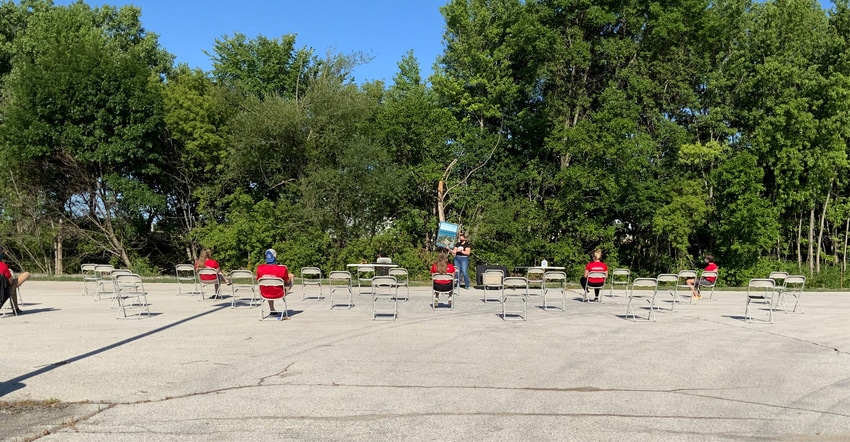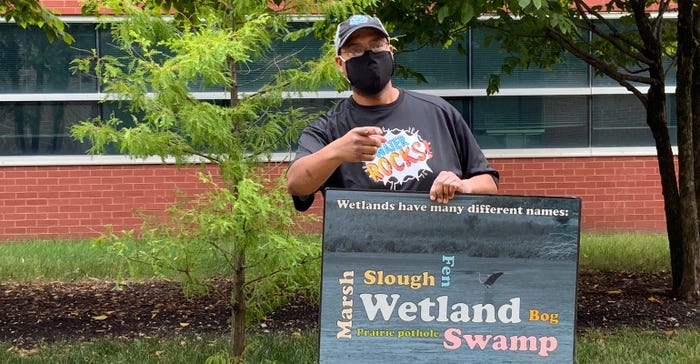July 22, 2020

Just as every school district in Iowa is making plans to return to in-school learning, the Water Rocks! team has been evaluating and imagining ways to provide its water quality, conservation and natural resources education content in ways that align with social distancing norms.
For many years, the award-winning Water Rocks programs have been in high demand in elementary and middle schools, providing science- and research-based education combined with a healthy complement of music, fun and hands-on activities.
“Since 2012, Water Rocks has been delivering high-energy, high-impact environmental education programs in schools across Iowa,” says Ann Staudt, Water Rocks director. “Teachers, administrators and students tell us they look forward to the next visit from Water Rocks, and we want to continue to respond to their requests and meet the education needs in a safe way.”
Provide safe learning experience
As schools reopen, Water Rocks plans to offer both assembly and classroom programs with some modifications to the delivery method, staging and scheduling of the events. In particular, all presentations will be moved outdoors.
“Clearly, a 300-student assembly in an auditorium, complete with dancing, singing, skits and audience interaction is not going to be possible in the near term,” Staudt says. “Complying with ISU and individual school policies, and taking advantage of Iowa’s pleasant fall weather, Water Rocks will be bringing in-person, outdoor programming to schools this fall.”

CREATIVITY: Providing fun and engaging programs, Water Rocks will be retooled to maximize participation while minimizing shared materials and spaces.

With the benefit of years of outdoor experience gained from using its Conservation Station trailers at county fairs and youth outdoor classrooms, the Water Rocks teams will set up and deliver the programs in available outdoor spaces at the schools. The setup for each site will be coordinated with the school’s administration to ensure appropriate social distancing is employed, and the Water Rocks teams will manage personal interactions to maximize safe learning.
“We will still provide fun and engaging programs,” Staudt says. “They will just be retooled for a slightly different setting using some modified methods to maximize participation while minimizing shared materials and shared spaces.”
Bringing field trips to schools
Some schools are expected to significantly restrict visitors, and many will likely limit or eliminate field trips, until more is known about management and mitigation during the global pandemic. The outdoor staging of Water Rocks visits could be one way to provide science content to students while remaining compliant with policies.
“A Water Rocks school visit can be like bringing the field trip to the school,” Staudt says. “We’ve had some informal discussions with teachers and administrators who have been strong Water Rocks advocates and received qualified warm feedback. We are eager to make the program available and are committed to flexibly working with the schools to deliver what is best for students when and where the teachers and administrators want it.”
Water Rocks program options for the 2020 fall semester include the following topics:
Natural Resources (grades K-2)
Watershed (grades 3-8)
Wetlands (grades 3-8)
Pollinators (grades 4-8)
Coordinating with school districts
Each program includes games and physical activities to engage minds and bodies, and is grounded in science. Teachers are provided with classroom resources that enable them to prepare students to learn and follow up on what was taught after the program. All Water Rocks programming is correlated to the Next Generation Science Standards adopted by most Iowa school districts.
Water Rocks will work with each interested school to determine the best presentation method based on available space and the number of students to be included. Because each setting will have unique limitations and opportunities, Water Rocks will waive its fees during the fall semester. Preferred outdoor settings include parking lots or grassy areas, but could also encompass sport stadiums and bleachers.
The Water Rocks teams are accustomed to working with sound amplification equipment, so there is no concern about adjusting to meet the needs of any surroundings to ensure a quality experience for all participants.
“We are eager for the opportunity to bring exciting science content to the schools with appropriate safety measures,” Staudt says. “This is new territory for Water Rocks and the schools, but our team has been out practicing, setting up mock school presentations, revamping the designs of our interactive materials to ensure social distancing, and making sure we are ready for pretty much any twist or turn we might face.”
Water Rocks will begin scheduling fall semester visits in mid-August. Visit waterrocks.org to learn more or inquire about arranging a program for your local school.
Ripley is a Water Rocks educator and conservation outreach specialist.
Source: Iowa Learning Farms, which is solely responsible for the information provided and is wholly owned by the source. Informa Business Media and all its subsidiaries are not responsible for any of the content contained in this information asset.
About the Author(s)
You May Also Like




